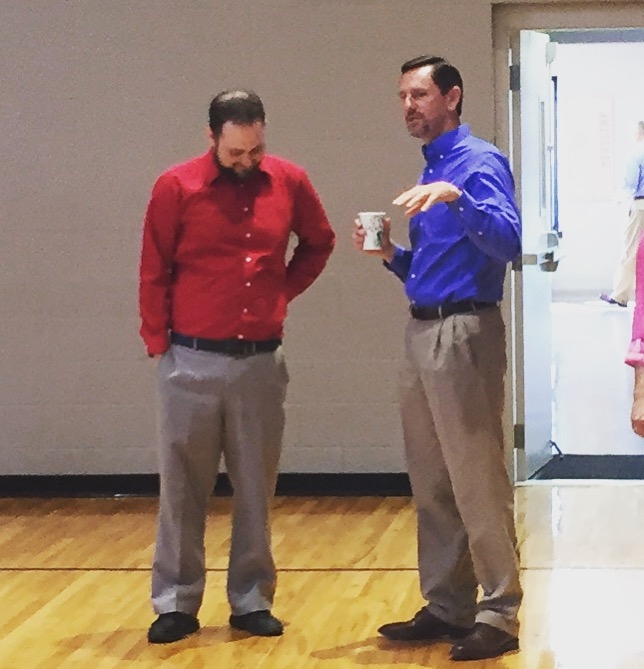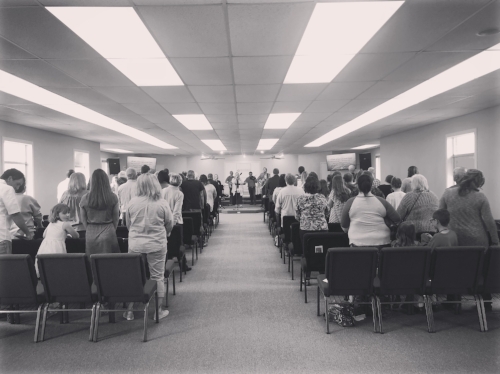Faith is a wrestle with doubt, for true faith demands reason. Indeed, one of the problems in the Protestant world today is our prideful lack of engaging Biblical & cultural issues with our minds, which ironically is one of the ways our Lord commands his followers to love him. Noted Notre Dame historian Mark Noll addresses this modern shortcoming in his book The Scandal of the Evangelical Mind. Sadly, in many church circles it has become meritorious not to critically assess and understand Scriptural doctrines and confessions, doctrines and confessions for which many of our forebears (not to mention our Savior) gave their lives. While informational availability is at all-time high, Biblical literacy is at an historic low. Contrary to popular belief, our faith is not "blind.” Jesus made sure there were witnesses who attested to his bodily resurrection. The New Testament authors compel us to “search the Scriptures,” to always be able to give a reason for the hope that lies within us. It is to our shameful neglect when we do not "desire the sincere milk of the word, that we may grow thereby."
Yet, even the most reasoned and experienced believers struggle with their faith from time to time. Spiritual discouragement comes to the best of us. Legend has it that D.L. Moody, the world-famous evangelist based out of Chicago in the latter 19th century, was once approached by a woman who smugly told him that she had never once doubted her salvation, to which Moody reportedly replied, “Madam, I doubt you are saved.” Matthew, the tax collector turned gospel writer, records an account of John the Baptist, whom Jesus lauds as the greatest born of women, nevertheless struggling with his own grasp of the gospel. John had preached repentance in the wilderness, letting loose his righteous condemnation of the Pharisees as a “brood of vipers” who should “flee the wrath to come.” He had boldly gotten in King Herod’s face when Herod took his brother’s wife as his own, committing adultery. As a result of his rebuke, the Jewish tetrarch had him thrown in prison. It was from that prison cell that John began to doubt. Much like Christian’s low disposition after encountering the Giant of Despair upon arrival at Doubting Castle (John Bunyan's Pilgrim’s Progress), the voice crying in the wilderness suddenly became overcome with spiritual laryngitis. Finally, he sent word to Jesus through his own disciples: “Are you the one who is to come, or shall we look for another?"
I know what it’s like to ask that question. At the age of 15, I underwent the most profound period of doubt I have ever known. I had struggled off and on for years with making sure I had “done everything right” in seeking the Lord’s salvation. Oh, I had seen him work and had known the power of answered prayers, even having the privilege of having led several people to faith myself by that age, but to really know that I could fully trust God was a concept I just had trouble grasping. I suspect others have been there. Did I really confess and repent of my sins, was I trusting in Jesus alone for salvation, and if perfect love casts out fear, why was I still afraid? Dad tried to reason with me from the Scriptures (this John the Baptist passage from Matthew 11 was one of his favorites to teach in the Youth Sunday School class I was in). On the way home from church one night, he said to me in frustration, "Son, you're going to wake up one day and find yourself pleasantly surprised that you made it to heaven." I sure hoped so. I walked in on Mom one time and found her in tears over my spiritual depression. I spent a lot of time in Scripture and prayer during my sophomore year of high school, asking God to deliver me from doubt.
Out of all the circumstances my pastor walked me through during his life (and there were MANY), this one still stands out above the others. He read me numerous Scripture passages, then said something that has stood with me: the only people who really doubt their salvation are those who truly know God or are truly seeking him. Otherwise, why does someone who doesn’t know God or isn’t seeking him have any reason to doubt what they don’t possess and don’t seek? They don’t doubt precisely because they don’t believe. He then asked, “Barry, are you willing to trust God with everything you have, whatever the consequences? Heaven or hell, sing or swim, your faith is in him.” I told him I was. He responded, “Why don’t you tell him that?” So I did. The peace of God overwhelmed my heart, assuring me that I was his child.
Although at times we can more easily sense the working of God than at others, faith is ultimately not dependent on our feelings, but on what we believe, in whom we choose to trust, and it’s not until we believe that we begin to understand. Noble Augustine, in his own struggle with faith, remarked that he used to attempt to understand in order to believe, but he finally came to the point where he believed in order to understand. Despite all the evidence in the world at our disposal, one must still place their visible trust in the invisible God. I love how Jesus doesn’t give John a straight yes or no answer in his response: "Go and tell John what you hear and see: the blind receive their sight and the lame walk, lepers are cleansed and the deaf hear, and the dead are raised up, and the poor have good news preached to them. And blessed is the one who is not offended by me.” The implication: I am the one you are seeking. Trust in me.
After his crucifixion, the disciples of Christ are holed up in an upper room somewhere in Jerusalem, their leader presumably gone. Jesus miraculously appears to them in bodily form, displaying his resurrected body. But one of them, Thomas, was missing. When the others tell Thomas that they have seen the risen Lord, Thomas infamously replies, “Unless I see his pierced hands and side, I won’t believe.” The following week, with Thomas in tow, Jesus once again manifests his physical glory in their presence. He invites Thomas to see his pierced hands and to feel his pierced side, to which the disciple replies, “My Lord and my God!” And then, in case we’re also tempted to doubt, Jesus turns directly to you and me: Thomas, you have believed because you have seen, but blessed are those who have not seen and yet believe. The New Testament writers summarize it well a few years later: whom having not seen, you love.
So take heart, believer, because it’s not nearly as important how much faith you have, as who your faith is in that moves mountains. Thanks be to God for granting childlike faith to the least of these, including me.




























